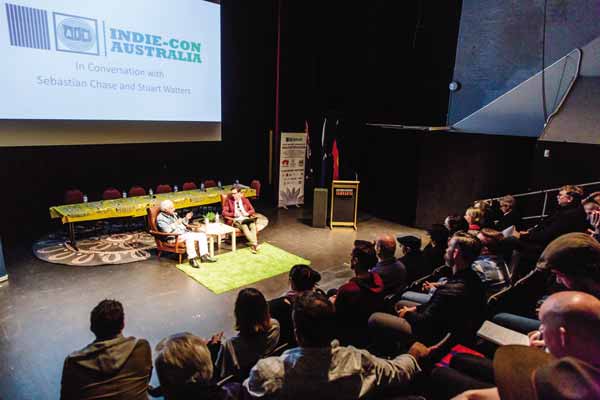Indie-Con Australia 2021, presented by AIR (Australian Independent Record Labels Association) kicked on virtually last week with crunchy nourishment for our industry, purpose-built for the time we are in right now.
Sounds Australia began the conference with an address on touring internationally, or rather, what that looks like now and into the future.Adaptation is the theme of the equation, which includes diving into new territories, and established but less obvious ones that have been growing during this time of increased domestic* consumption worldwide. *domestic as in, 'in houses', not just 'in Australia'.
Such other avenues that aren't necessarily the most obvious for fledgling recording artists to consider are composing for gaming and sync – synchronisation to any other use form, like advertising, TV, film, gaming, trailers and more.
Music supervisors are often looking for things like Beatles and Tame Impala vibes – something known that they envisage as the perfect match for the spot they need audio over, but on a more modest budget.
Throughout the conference we heard from all the sides of the industry: labels, management, technology platforms and independent artists, even a finance provider who understands and appreciates the value of the assets intellectual property holders own. Yes, that means you, writing songs in your bedroom, on the bus and in your sharehouse (parents') kitchen.
We witnessed an exchange about the value of being an engaging artist in all the ways you choose to emanate as one, right down to the smallest relationship, and the selection of your team.
Independent labels and artists need an ecosystem of skills and a soup of resources, and although independent labels, artists and music business entrepreneurs have to wear many hats, we can't wear them all at once.
Mardi Caught, former major label exec who launched marketing services company The Annex, expanded on the change idea in her keynote on day two – the themes have actually always been disruption, adaptation and acceleration.
As Jaddan Comerford said (in dialogue with Mardi in the keynote), when he started Boomtown Records (later becoming the group of companies known as Unified, or UNFD) when Napster was at its peak: "Sometimes the worst time is the best time," to start something, and be disruptive.
ARIA and multiple Golden Guitar winner Fanny Lumsden explained that she doesn't separate the releasing and marketing from the creating of her work, but rather a continuous flow. Other panellists agreed, that this kind of idea helps keep the truth in the product and the relationship between creator and consumer, as exemplified by Fanny's bold and very personalised marketing ideas.
We heard how physical copies are still a thing (this enthused listener gleefully brandishes John Mayer's latest on cassette: #vanlife) particularly in folk and country, but also the role of vinyl and other physicals in extending the life of a release's campaign.
Mike Warner (Chartmetric) insists on the extraneous value of music presented in hard copy: "This is a piece of art you're selling." Certainly, Anika Ostendorf (aka Hachiku, Milk! Records) attests to release timelines' close relationship with vinyl production turnaround.
New tech platforms for networking, data collection and analysis, and new methods of sale (here's looking at you, NFTs) were also covered, or at least introduced, with sessions just long enough to give a good starting point to motivate indies to do further discovery, which is of course the point.
Yes there are challenges, but the beauty in this conference was that there is certainly hope for the music industry. While there are humans breathing and watching and listening, there are ways to connect and to be viable.
In the closing discussion, between journalist and radio host Sosefina Fuamoli and Anthony Zaccaria (co-founder Linktree, Bolster), Anthony had this exhortation: "Don't start one day, start yesterday." Sosefina points out that "everyone has had to relearn their position over the last year" - it certainly is a rare opportunity where disruption is so ubiquitous.
There really could never be a better time to adapt and accelerate – and AIR has a community of resources that can help do just that.
"In yet another year plagued by lockdowns and challenges brought on by the pandemic," AIR's CEO Maria Amato said, "it was great to see the Australian independent music sector come together at Indie-Con to discuss important issues, learn how to use technology to connect and transact in today’s environment, discover new opportunities and ensure copyrights are protected and monetised."

